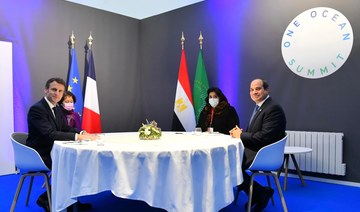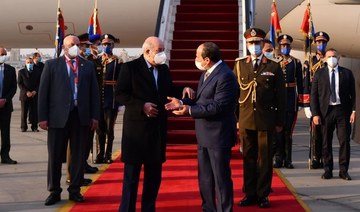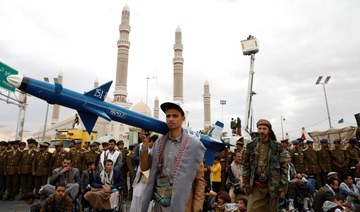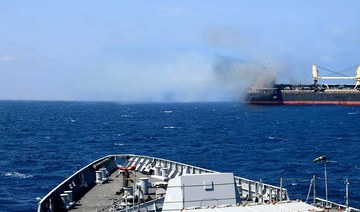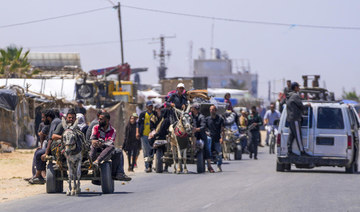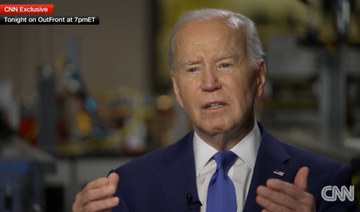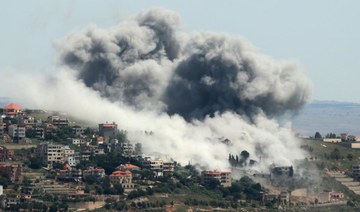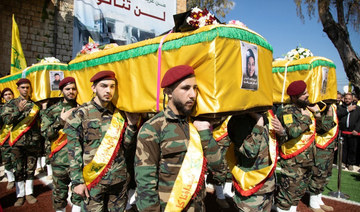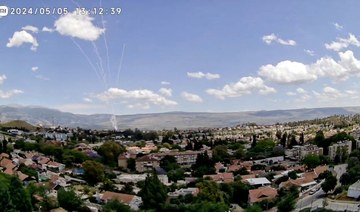CAIRO: Egyptian President Abdel Fattah El-Sisi reaffirmed “Egypt’s firm support for the leadership and government in Tunisia in taking any measures to preserve the integrity of the Tunisian state and achieve stability in the country.”
During his meeting yesterday evening in the French city of Brest with Tunisian Prime Minister Najla Boden, President El-Sisi spoke of “Egypt’s confidence in the ability of the Tunisian authority, led by President Kais Saied, to cross the current delicate stage to a future that meets the aspirations of the brotherly Tunisian people.”
The Egyptian president’s spokesman, Ambassador Bassam Rady, said that the president asked to convey his greetings to his Tunisian counterpart, expressing the appreciation that Egypt, its leadership and people have for the close historical bonds that unite the two countries.
The Tunisian prime minister affirmed “Tunisia’s pride in the solid and extended ties between the two countries and the Tunisian side’s keenness to continue the pace of consultation and coordination between the two brotherly countries on regional issues of common concern, in the face of various challenges in the region at the current time.” He expressed appreciation for Egypt’s efforts in support of Tunisia and its vital role in maintaining regional security and stability.
The spokesman added that the talks touched on ways to strengthen bilateral relations between the two countries at all levels, especially with regard to facilitating the movement of trade exchange and increasing the volume of inter-investment.
The two sides expressed their satisfaction with the level of cooperation and coordination between the two countries.
They also discussed a number of regional and international issues of common interest, especially the developments in Libya. They agreed to intensify joint coordination to support all efforts aimed at preserving Libya’s stability, unity and territorial integrity.
President El-Sisi renews Egypt’s support for the Tunisian leadership
https://arab.news/5sc3k
President El-Sisi renews Egypt’s support for the Tunisian leadership
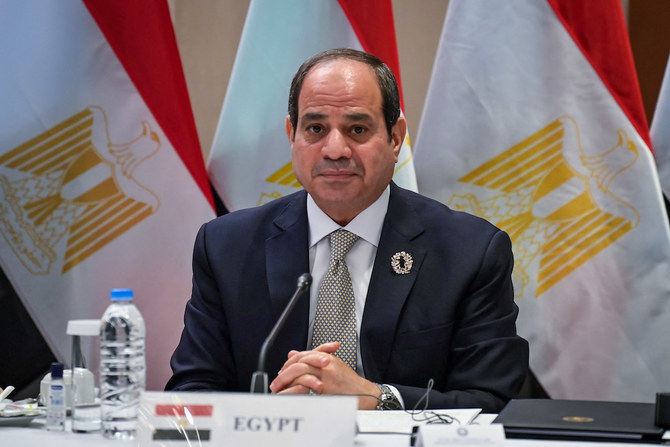
- Tunisian PM affirmed Tunisia’s pride in the solid and extended ties between the two countries
Israeli demonstrators torch part of UN compound in Jerusalem
Philippe Lazzarini, the head of UNWRA, said in a post on the social media platform X that he had decided to close the compound until proper security was restored. He said Thursday’s incident was the second in less than a week.
“This is an outrageous development. Once again, the lives of UN staff were at a serious risk,” he said.
“It is the responsibility of the State of Israel as an occupying power to ensure that United Nations personnel and facilities are protected at all times,” he said.
UNRWA, set up to deal with the Palestinian refugees who fled or were forced from their homes during the 1948 war around the time of Israel’s creation, has long been a target of Israeli hostility.
Since the start of the war with Gaza Israeli officials have called repeatedly for the agency to be shut down, accusing it of complicity with the Islamist movement Hamas in Gaza, a charge the United Nations strongly rejects.
Israel considers all of Jerusalem its indivisible capital, including eastern parts it captured in a 1967 war, which Palestinians seek as the future capital of an independent state.
Lazzarini said staff were present at the time of the incident but there were no casualties. However outdoor areas were damaged by the blaze, which was put out by staff after emergency services took time to respond.
There was no immediate comment from the Israeli police.
Lazzarini said groups of Israelis had been staging regular demonstrations outside the UNRWA compound for the past two months and said stones were thrown at staff and buildings in the compound this week.
In footage shared with Lazzarini’s post, smoke can be seen rising near buildings at the edge of the compound while the sound of chanting and singing can be heard.
A crowd accompanied by armed men were witnessed outside the compound chanting “Burn down the United Nations,” Lazzarini said.
UKMTO reports hijacking attempt of vessel east of Yemen’s Aden
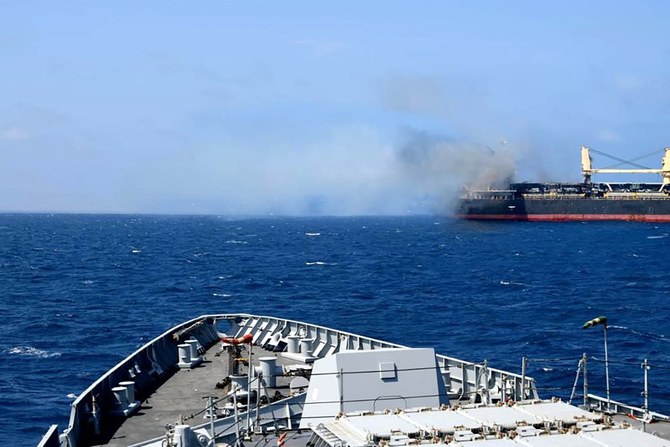
DUBAI: The United Kingdom Maritime Trade Operations (UKMTO) organization said on Friday it had received a report of a failed hijacking attempt of a vessel 195 nautical miles east of Yemen’s Aden.
The vessel’s master reported being approached by a small craft carrying five or six armed people with ladders.
Houthi militants in Yemen have launched drone and missile attacks on shipping in and around the Red Sea and the Indian Ocean to show support for the Palestinians in the Gaza war.
Maritime sources say pirates may be encouraged by a relaxation of security or may be taking advantage of the chaos caused by attacks on shipping by the Iran-aligned Houthis.
After firing on the vessel, the people in the small craft were forced to abort their approach when the security team on the vessel returned fire, the UKMTO reported.
The vessel and its crew are reported to be safe, and the vessel is proceeding to its next port of call, it said.
Hamas says ‘ball is completely’ in Israel’s hands in Gaza truce talks
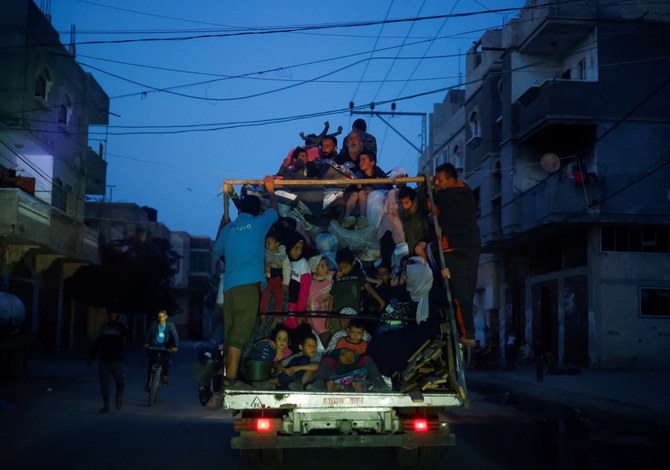
GAZA STRIP: Palestinian militant group Hamas said early Friday that its delegation attending Gaza ceasefire negotiations in Cairo had left the city for Qatar, adding the “ball is now completely” in Israel’s hands.
“The negotiating delegation left Cairo heading to Doha. In practice, the occupation (Israel) rejected the proposal submitted by the mediators and raised objections to it on several central issues,” the group said in a message to other Palestinian factions, adding it stood by the proposal.
“Accordingly, the ball is now completely in the hands of the occupation.”
State-linked Egyptian outlet Al-Qahera News reported Thursday that representatives of both camps left Cairo after two days of negotiations aimed at finalizing a ceasefire deal in the seven-month war in the Gaza Strip.
Efforts by Egypt and other mediators, namely Qatar and the United States, “continue to bring the points of view of the two parties closer together,” the outlet added, citing a high-level Egyptian source.
Hamas said Monday that it had accepted a ceasefire proposal put forward by mediators.
The deal, the group said, involved a withdrawal of Israeli forces from Gaza, the return of Palestinians displaced by the war, and the exchange of hostages held by militants for Palestinian prisoners detained in Israel, with the aim of a “permanent ceasefire.”
Netanyahu’s office at the time called the proposal “far from Israel’s essential demands,” but said the government would still send negotiators to Cairo.
Israel has long been resistant to the idea of a permanent ceasefire, insisting it must finish the job of dismantling Hamas.
Netanyahu on US threat to withhold arms: Israel will fight with its ‘fingernails’ if needed
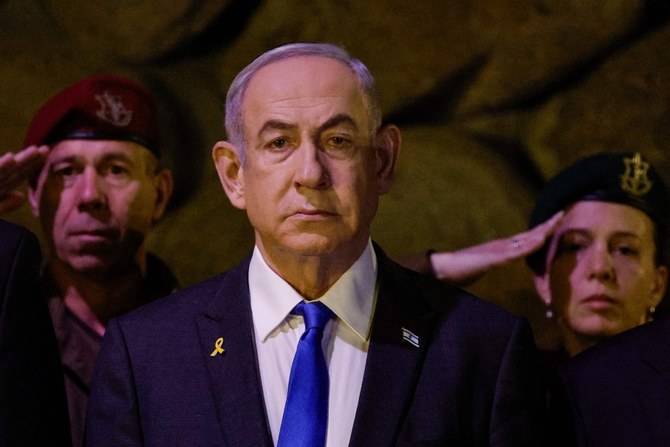
- Israel says Rafah is the last stronghold of Hamas
- Aid groups say a Rafah invasion would be catastrophic
JERUSALEM: Prime Minister Benjamin Netanyahu said Thursday that a US threat to withhold some arms would not prevent Israel from continuing its offensive in Gaza, indicating it might proceed with an invasion of the packed city of Rafah against the wishes of its closest ally.
President Joe Biden has urged Israel not to go ahead with such an operation over fears it would exacerbate the humanitarian catastrophe in the Palestinian enclave. On Wednesday, he said the United States would not provide offensive weapons for a Rafah offensive, raising pressure on Netanyahu.
But in a statement released Thursday, Netanyahu said “if we have to stand alone, we will stand alone. If we need to, we will fight with our fingernails. But we have much more than fingernails.”
Israel’s top military spokesman, Rear Adm. Daniel Hagari, also appeared to downplay the practical impact of any arms holdup. “The army has munitions for the missions it plans, and for the missions in Rafah, too — we have what we need,” he said in response to a question at a news conference.
Israel has repeatedly threatened to invade Rafah, where some 1.3 million Palestinians — over half the population — have sought refuge. The city in southern Gaza is also the main hub for humanitarian operations, which have been severely hindered by the closure of Gaza’s two main crossings this week.
Israel says Rafah is the last stronghold of Hamas and that the army must go in if it hopes to dismantle the group and return scores of hostages captured in the Oct. 7 attack that triggered the war.
In an earlier response to Biden’s decision, Israel’s far-right National Security Minister Itamar Ben-Gvir wrote a post on the platform X with a heart between the words “Hamas” and “Biden.” He and other ultra-nationalist members of Netanyahu’s coalition support a large-scale Rafah operation and have threatened to bring down his government if it doesn’t happen.
Aid groups say a Rafah invasion would be catastrophic. The UN says most of the territory’s 2.3 million Palestinians suffer from hunger and that northern Gaza is already experiencing “full-blown famine.”
Even the limited operation Israel launched earlier this week, in which a tank brigade captured the Gaza side of the Rafah border crossing with Egypt, has thrown humanitarian operations into crisis.
It also complicated what had been months of efforts by the US, Qatar and Egypt to broker a ceasefire and the release of hostages. Hamas this week said it had accepted an Egyptian-Qatari ceasefire proposal, but Israel says the plan does not meet its “core” demands. Several days of follow-up talks appeared to end inconclusively on Thursday.
Some analysts said Biden’s tough line against Israel, and the rift between the allies, threatened to weaken Israel’s negotiating position and harden Hamas’ stances. Hamas has demanded guarantees for an end to the war and a full Israeli withdrawal from Gaza as part of any deal — steps Israel has ruled out.
“It sends a discordant message at a time when Hamas is holding out on a hostage deal in the hopes that pressure will grow on Israel and it will gain a ceasefire without having to give anything in return,” said the Israel Policy Forum, a pro-Israel organization based in New York.
The war began with Hamas’ surprise attack into southern Israel, in which it killed some 1,200 people, mostly civilians, and took another 250 hostage. The militants are still holding some 100 captives and the remains of more than 30 after most of the rest were released during a ceasefire last year.
The war has killed over 34,800 Palestinians, mostly women and children, according to the Gaza Health Ministry. Israel’s offensive, waged with US-supplied munitions, has caused widespread devastation and forced some 80 percent of Gaza’s population to flee their homes.
Israel’s capture of the Rafah crossing Tuesday forced the closure of a key entry point for fuel, and it’s unclear when it will reopen. The UN agency for Palestinian refugees, known as UNRWA, said it only has enough stocks to maintain operations for a few days and has started rationing.
Israel reopened its side of the nearby Kerem Shalom crossing — Gaza’s main cargo terminal — after a rocket attack over the weekend, but UNRWA, the main provider of aid in Gaza, says aid cannot be brought in on the Palestinian side because of the security situation.
A recently reopened route in the north is still functioning, but only 60 trucks entered on Tuesday, far below the 500 that entered Gaza each day before the war.
The first aid ship bound for an American-built floating pier to be installed in Gaza departed early Thursday. But it’s unclear when that corridor will be up and running, and even then it won’t be able to handle as much aid as Gaza’s two main land crossings.
Maj. Pete Nguyen, a Pentagon spokesman, said Thursday that parts of the pier are still in the Israeli port of Ashdod awaiting more favorable seas before being moved into position off Gaza. He said the US vessel Sagamore, which left Cyprus, would transport aid to another ship, the Roy P. Benavidez, which is off the coast of Gaza.
“In the coming days, the US will commence an international community-backed effort to expand the delivery of humanitarian assistance to the people of Gaza using a floating pier,” he said.
Hezbollah attacks Israeli barracks after party members killed in drone strike
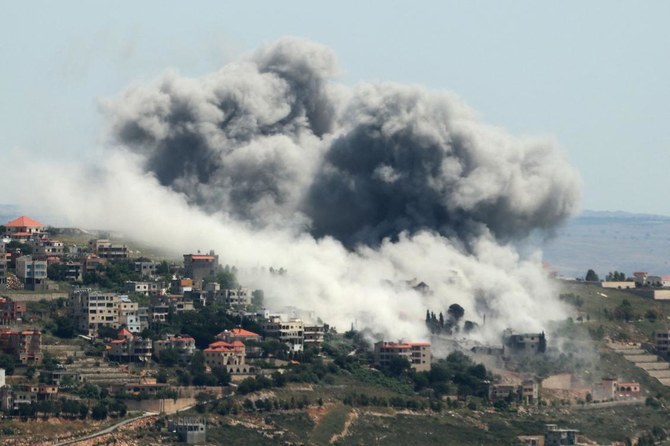
- Gallant threatens ‘open war’ against Lebanon, warns troops to prepare for ‘hot summer’
BEIRUT: Hezbollah launched several attacks on Israeli military targets across Lebanon’s border on Thursday after four of its members were killed in Israeli strikes, security sources said.
Israeli drones on Thursday had struck a car in Bafliyeh, Tyre — 99 km from Beirut — that was transporting Hezbollah members.
The group announced the death of two of its members, followed by a third who died from severe injuries.
Although Bafliyeh is located south of the Litani Line, it has never been targeted over the past seven months, making the attack a violation of the rules of engagement.
The town is located in a vital area, close to Tyre and surrounded by villages where UNIFIL forces operate.
A security source said that four Israeli drones hovered over several towns in the vicinity of Tyre and chased a car on the Bafliyeh-Arzoun road.
The drones then fired several missiles at the vehicle, destroying it.
Lebanon’s civil defense rescue force said that its members extinguished a fire inside a car that Israeli drones had struck.
It said that the bodies of the victims were pulled out of the car by the rescue force and transferred to hospital.
Hezbollah announced the death of Ali Ahmad Hamza, born in 1958, from Debaal, southern Lebanon, as well as Ahmad Hassan Maatouk, born in 1989, from the Lebanese southern village of Sir Al-Gharbiyeh.
It later confirmed the death of Hussein Ahmad Hamdan from Burj Al-Barajneh, located in the southern suburbs of Beirut.
Hezbollah responded to the assassination by striking Israeli military sites, including destroying “technical systems” developed in the Israeli Ramia outpost.
It also struck a new command center in the Natur settlement with artillery as well as a “group of soldiers in the Al-Jerdah site, killing and injuring them.”
The escalation on the southern Lebanese front coincided with further Israeli threats of open war against Lebanon.
Israeli Defense Minister Yoav Gallant said: “We will achieve our goals in the north and south. We will paralyze Hamas, destroy Hezbollah and achieve security.”
Hezbollah struck Israeli military sites and settlements in the north with dozens of missiles on Wednesday evening after Gallant visited his army’s positions in the north.
Gallant addressed the reserve forces of the 91st Division (affiliated with the Northern Command and responsible for the front with Lebanon, from Ras Naqoura to Mount Hermon) at the Branit Barracks.
The minister warned troops to be “prepared for a hot summer.”
Gallant said that Tel Aviv “is determined to return the residents of the northern areas that were evacuated amid the ongoing border confrontations with Hezbollah.”
He added that “the mission is not accomplished” in the area.
According to Israeli media, Hezbollah missiles “targeted the headquarters of the 91st Division” shortly after Gallant left.
According to an Israeli statement, Gallant, during his visit, was briefed on “operations to adapt operational activities in confronting Hezbollah forces.”
Hezbollah said in a statement that its members targeted the headquarters of the 91st Division in the Branit Barracks “with a heavy-caliber Burkan missile, causing a direct hit.”
Israeli shelling and airstrikes on the border area on Wednesday night led to the killing of five members of Hezbollah and the Islamic Jihad movement.
Hezbollah mourned Hassan Mohammed Ismail (born in 1993) from Kfarkela in the south and Mustafa Ali Issa (born in 1988) from Dlafy in western Bekaa.
Also on Thursday, the Lebanese branch of the Al-Quds Brigades — the military wing of the Islamic Jihad movement — mourned Mahmoud Mohammed Balawni, Ahmed Mohammed Halawa and Mohammed Hussein Joud from the Martyr Ali Al-Aswad Brigade — Syrian Square.
Israeli threats emerged after Lebanon received warnings from European sources about the potential for escalation in southern Lebanon over the coming months.
A political observer said that several Lebanese officials who visited Paris had conveyed warning messages regarding the situation.
In Beirut, the parliamentary foreign affairs committee listened to a report from Human Rights Watch on documented Israeli attacks on civilians in Lebanon.
MP Fadi Alame spoke of “war crimes committed, especially the deliberate shelling of journalists and the martyrdom of some, the use of white phosphorus in Gaza and Lebanon and the resulting damages, and the type of weapons used to kill paramedics.”
He said: “The government submitted a report through the Ministry of Foreign Affairs requesting the international court to conduct necessary investigations into violations and war crimes, and the foreign affairs committee is coordinating with the Ministry of Foreign Affairs to ensure the effectiveness and speed of action.
“This is Lebanon’s right to demand (compensation) for the damage incurred.”



